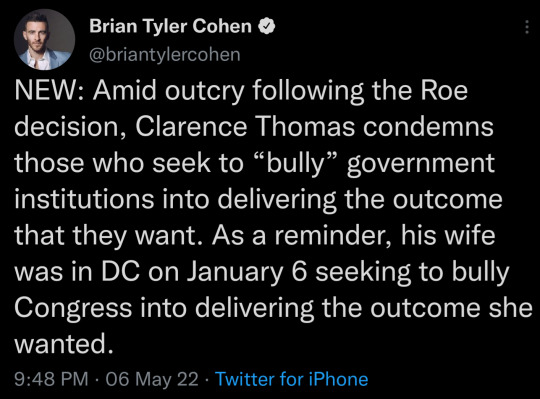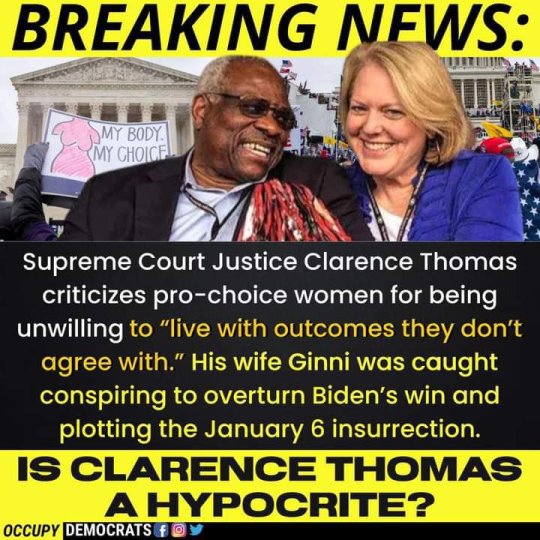#jan 6 investigation
Text
Barely a day after former President Donald Trump was indicted for the third time, some Senate Republicans are already trying to undermine the credibility of the federal judge who was randomly assigned to preside over his trial.
Here’s a detail they’re hoping you won’t notice: They unanimously voted to confirm her.
Sen. Ted Cruz (R-Texas), speaking on his podcast on Wednesday, accused U.S. District Judge Tanya Chutkan of being “relentlessly hostile” to Trump and claimed that she has “a reputation for being far-left, even by D.C. District Court standards.”
But Cruz voted to put Chutkan into her seat on the U.S. District Court for the District of Columbia in June 2014. So did every other Senate Republican when she was unanimously confirmed, 95-0.
That includes Sen. Lindsey Graham (R-S.C.), who nonsensically claimed Wednesday that “any conviction in D.C. against Donald Trump is not legitimate.”
“The judge in this case hates Trump,” Graham said in a Fox News interview. “You can convict Trump of kidnapping Lindbergh’s baby in D.C. You need to have a change of venue. We need a new judge. And we need to win in 2024 to stop this crazy crap.”
Aides to Cruz and Graham did not respond to requests for comment on how the senators square their votes to confirm Chutkan with their criticisms of her ability to be a fair judge.
Tuesday’s federal indictment of Trump accuses him of serious crimes related to the 2020 presidential election and the Jan. 6, 2021, Capitol insurrection: conspiracy to defraud the United States, conspiracy to obstruct an official proceeding, obstruction of and attempt to obstruct an official proceeding, and conspiracy against rights.
Chutkan, a Jamaica-born former assistant public defender and an appointee of former President Barack Obama, has already been overseeing cases related to the Jan. 6 attack. She’s handed out some of the most aggressive sentences yet to rioters who took part in the violence that day. Of the 11 cases that have come before her, she imposed tougher sentences than those sought by the Justice Department seven times and matched what the Justice Department was seeking four times, according to an Associated Press review.
In all 11 cases, Chutkan sentenced the defendants to prison time.
This is what is likely driving the GOP attacks on Chutkan: They know she’s not likely to go easy on Trump now.
Beyond trying to discredit the judge, some Republicans, like Graham, are parroting Trump’s absurd demand for a change of venue. The former president has called for moving his case to the “more diverse” and “politically unbiased nearby State of West Virginia!” (Virginia and Maryland are much closer to D.C., for what it’s worth.)
Not a single Republican raised concerns about Chutkan during her nomination hearing in the Senate Judiciary Committee in February 2014. In fact, only one GOP member of the committee even showed up to the hearing: Sen. John Cornyn (Texas), who was only there to rave about a separate Texas judicial nominee on the schedule. He left before Chutkan was up.
Cruz and Graham were both members of the committee at the time.
Neither attended Chutkan’s hearing.
#us politics#news#huffington post#republicans#conservatives#donald trump#2023#capitol protests#capitol riot#capitol riot investigation#jan 6 investigation#jan 6 insurrection#sen. ted cruz#Judge Tanya Chutkan#U.S. District Court for the District of Columbia#us senate#sen. lindsey graham#conspiracy to defraud the United States#conspiracy to obstruct an official proceeding#obstruction of congress#attempt to obstruct an official proceeding#conspiracy against rights#the associated press#West Virginia#Senate Judiciary Committee#Sen. John Cornyn
252 notes
·
View notes
Text
Between Alex Jones getting perjury'd to oblivion and the FBI raiding Trump's Mar-o-lago home, August is proving to be entertaining as fuck
#politics#us politics#american politics#alex jones die challenge#trump die challenge#then theres also every Republican ever voting against all human rights benefits & info being leaked that the fbi received 100s of tips#about kavanuts during his investigation & the jan 6 terrorists are starting to get hit w sentences... i hope this ball keeps rolling lmao#alex jones#donald trump#tc posts
4K notes
·
View notes
Text

#donald trump#the fucking suspense is killing me#i want to see this mf go DOWN#gop#indictment#jan 6 insurrection#georgia elections#criminal investigation#vanity fair#article
10 notes
·
View notes
Text


#us politics#scotus#us supreme court#ginni thomas#justice clarence thomas#capitol protests#capitol riot#capitol riot investigation#jan 6 insurrection#insurrectionists#roe v. wade#scotus leak#abortions#abortion bans#2022#trump administration#2021#brian tyler cohen#tweet#twitter#occupy democrats
100 notes
·
View notes
Text
Hey y’all it’s digital hygiene hours again
It looks like the FBI is mopping up those Jan 6 rioters, which is great! There’s just one thing that’s a bit concerning: They’re using a relatively new technique called a geofence warrant. That’s where they require a private technology company (in this case, Google) to disclose information about all devices known to be within a specific area at a specific time.
Google told the FBI to get a warrant before they would hand over the data, but the fact that they could have just forked it over, or that they have the data at all, is pretty concerning. In this particular case, it was collected with Google’s Location History service, which is opt-in. (The switch for it is in the Data and Privacy tab of your Google account settings.) It’s really not a stretch to think that they could use it against people that are legitimately exercising their rights.
Google’s location services, as well as Apple’s and pretty much anyone else’s, rely on WiFi, Bluetooth, and GPS data rather than cell service.
The filing suggests that dozens of phones that were in airplane mode during the riot, or otherwise out of cell service, were caught up in the trawl. Nor could users erase their digital trails later. In fact, 37 people who attempted to delete their location data following the attacks were singled out by the FBI for greater scrutiny. (Mark Harris, Wired)
Without getting too much into the weeds, your phone sends out signals asking around for Wi-Fi networks and bluetooth devices it knows. When the requested network or device hears these, it replies to let your phone know that it’s nearby. (This is how auto-connect works with both WiFi and bluetooth.) Any device with an internet connection that receives WiFi and bluetooth, including other people’s phones, can receive these. By recording the signal strength and getting a lot of data points from nearby devices, individual phones can be located with much better precision than cell tower triangulation.
Basically, if you’re out protesting, exercising your rights, whatever, turn off your WiFi and bluetooth until you get home. If you need to maintain communication with your group to stay safe, you can even leave cell service on. A related article from Wired says that cell triangulation is only accurate to about three quarters of a mile, which is probably enough for plausible deniability in case you get targeted for exercising your rights. (This is not legal advice.)
Get out there, have fun, stay safe, and don’t fuck it up!
#digital safety#digital hygiene#internet safety#jan 6#jan 6 trial#fbi investigation#politics#activism#protesting
15 notes
·
View notes
Text

Speechiflied
#political satire#editorial cartoons#politics#political cartoon#mike pence#pence#house flies#jack smith#subpoenas#subpoena#jan 6 capitol riot investigation#jan 6 2021#us politics#insurrection
8 notes
·
View notes
Text
Jan. 6 Hearing Day 6 spoilers with no context

35 notes
·
View notes
Text
NV (& etc.) doodles from mostly my Astronomy class










#see guys? i swear I'm still an artist!#these are from like jan-apr I'm clearing out papers before school starts#1. based on a picrew i did. love it so much <3#2. based on my date night fic#3. the Investigators. best live show scene. never drew Carlos :(#4. based on a fic I read. they cute#5. discovered alooxis' nemeses animation!!#6 7 8. Establishing shots for a video i want to make one day...#9. will in the woods :))#10. me in my big ol Veronica Sawyer coat#tw blood#wtnv#welcome to night vale#wtnv fanart#cecil palmer#kevin wtnv#kevin wtdb#carlos the scientist#carlos robles#will wood
5 notes
·
View notes
Text

20 notes
·
View notes
Text
doesn't anyone else think it's weird that like there's been a sudden surge in posts talking about how funny jan 6th was? it feels weird like someone is trying to get people to remember it differently
#you're all falling for it by reblogging those posts that are like BUT WHAT ABOUT THE FUNNY PARTS OF JAN 6#there's literally still an active investigation going on people are still being charged...#like right wing extremists tried to kill politicians they brought weapons and nooses#they were let in by police#what is funny about that?
5 notes
·
View notes
Text
By Josh Marshall
I want to return to this revelatory interview with coconspirator John Eastman, the last portion of which was published Thursday by Tom Klingenstein, the Chairman of the Trumpite Claremont Institute and then highlighted by our Josh Kovensky. There’s a lot of atmospherics in this interview, a lot of bookshelf-lined tweedy gentility mixed with complaints about OSHA regulations and Drag Queen story hours. But the central bit comes just over half way through the interview when Eastman gets into the core justification and purpose for trying to overturn the results of the 2020 election and overthrow the constitutional order itself. He invokes the Declaration of Independence and says quite clearly that yes, we were trying to overthrow the government and argues that they were justified because of the sheer existential threat America was under because of the election of Joe Biden.
Jan 6th conspirators have spent more than two years claiming either that nothing really happened at all in the weeks leading up to January 6th or that it was just a peaceful protest that got a bit out of hand or that they were just making a good faith effort to follow the legal process. Eastman cuts through all of this and makes clear they were trying to overthrow (“abolish”) the government; they were justified in doing so; and the warrant for their actions is none other than the Declaration of Independence itself.
“Our Founders lay this case out,” says Eastman. “There’s actually a provision in the Declaration of Independence that a people will suffer abuses while they remain sufferable, tolerable while they remain tolerable. At some point abuses become so intolerable that it becomes not only their right but their duty to alter or abolish the existing government.”
“So that’s the question,” he tells Klingenstein. “Have the abuses or the threat of abuses become so intolerable that we have to be willing to push back?”
The answer for Eastman is clearly yes and that’s his justification for his and his associates extraordinary actions.
Let’s dig in for a moment to what this means because it’s a framework of thought or discourse that was central to many controversies in the first decades of the American Republic. The Declaration of Independence has no legal force under American law. It’s not a legal document. It’s a public explanation of a political decision: to break the colonies’ allegiance to Great Britain and form a new country. But it contains a number of claims and principles that became and remain central to American political life.
The one Eastman invokes here is the right to overthrow governments. The claim is that governments have no legitimacy or authority beyond their ability to serve the governed. Governments shouldn’t be overthrown over minor or transitory concerns. But when they become truly oppressive people have a right to get rid of them and start over. This may seem commonsensical to us. But that’s because we live a couple centuries downstream of these events and ideas. Governments at least in theory are justified by how they serve their populations rather than countries being essentially owned by the kings or nobilities which rule them.
But this is a highly protean idea. Who gets to decide? Indeed this question came up again and again over the next century each time the young republic faced a major political crisis, whether it was in the late 1790s, toward the end of the War of 1812, in 1832-33 or finally during the American Civil War. If one side didn’t get its way and wanted out what better authority to cite than the Declaration of Independence? There is an obvious difference but American political leaders needed a language to describe it. What they came up with is straightforward. It’s the difference between a constitutional or legal right and a revolutionary one. Abraham Lincoln was doing no more than stating a commonplace when he said this on the eve of the Civil War in his first inaugural address (emphasis added): “This country, with its institutions, belongs to the people who inhabit it. Whenever they shall grow weary of the existing Government, they can exercise their constitutional right of amending it or their revolutionary right to dismember or overthrow it.”
In other words, yes, you have a revolutionary right to overthrow the government if you really think its abuses have gotten that intractable and grave. But the government has an equal right to stop you, to defend itself or, as we see today, put you on trial if you fail. The American revolutionaries of 1776 knew full well that they were committing treason against the British monarchy. If they lost they would all hang. They accepted that. They didn’t claim that George III had no choice but to let them go.
From the beginning the Trump/Eastman coup plotters have tried to wrap their efforts in legal processes and procedures. It was their dissimulating shield to hide the reality of their coup plot and if needed give them legal immunity from the consequences. The leaders of the secession movement tried the same thing in 1861.
In a way I admire Eastman for coming clean. I don’t know whether he sees the writing on the wall and figures he might as well lay his argument out there or whether his grad school political theory pretensions and pride got the better of him and led him to state openly this indefensible truth. Either way he’s done it and not in any way that’s retrievable as a slip of the tongue. They knew it was a coup and they justified it to themselves in those terms. He just told us. They believed they were justified in trying to overthrow the government, whether because of OSHA chair size regulations or drag queens or, more broadly, because the common herd of us don’t understand the country’s “founding principles” the way Eastman and his weirdo clique do. But they did it. He just admitted it. And now they’re going to face the consequences.
#us politics#news#talking points memo#2023#op eds#Tom Klingenstein#Claremont Institute#john eastman#Josh Kovensky#Josh Marshall#jan 6 investigation#jan 6 insurrection#domestic terrorism#treason#traitors#donald trump#capitol riot investigation#Declaration of Independence
203 notes
·
View notes
Text
i'm probably an idiot for it but i hope that investigations into Homeland Security reignite dialogue about the department's scope. it should become increasingly obvious that the amount of political abuse it allowed in one term (even under extreme scrutiny from FBI, congress, and media) demands severe operational reduction. increased oversight won't suffice
#i've been saying since the capitol insurrection to investigate homeland investigate homeland#they fabricated terrorist plots in portland and have means and motive to create threat potential at seat of government#theres no shot that trump didn't direct appointments to allow circumstances of jan 6 and even social engineer already surveilled targets#they didn't discover this smoking gun in time for impeachment 2#thus the search for evidence of treason/espionage for criminal indictment a la selling intel assets
3 notes
·
View notes
Link
All these white folks talmbout some “defund the FBI”! Now you motherfuckers want to defund the FBI? All of sudden they’re corrupt & a criminal organization?

#donal trump#fbi#mar a lago#investigation#corruption#jan. 6 investigation#republicans#conservatives#crook#cnn#article
41 notes
·
View notes
Link
2 notes
·
View notes
Text
Me watching Cassidy Hutchinson's testimony.





#january 6#cassidy hutchinson#donald trump#mark meadows#testimony#omg#us politics#politics#jan 6 committee#jan 6 capitol attack#jan 6 capitol riot investigation#jan 6 insurrection
4 notes
·
View notes
